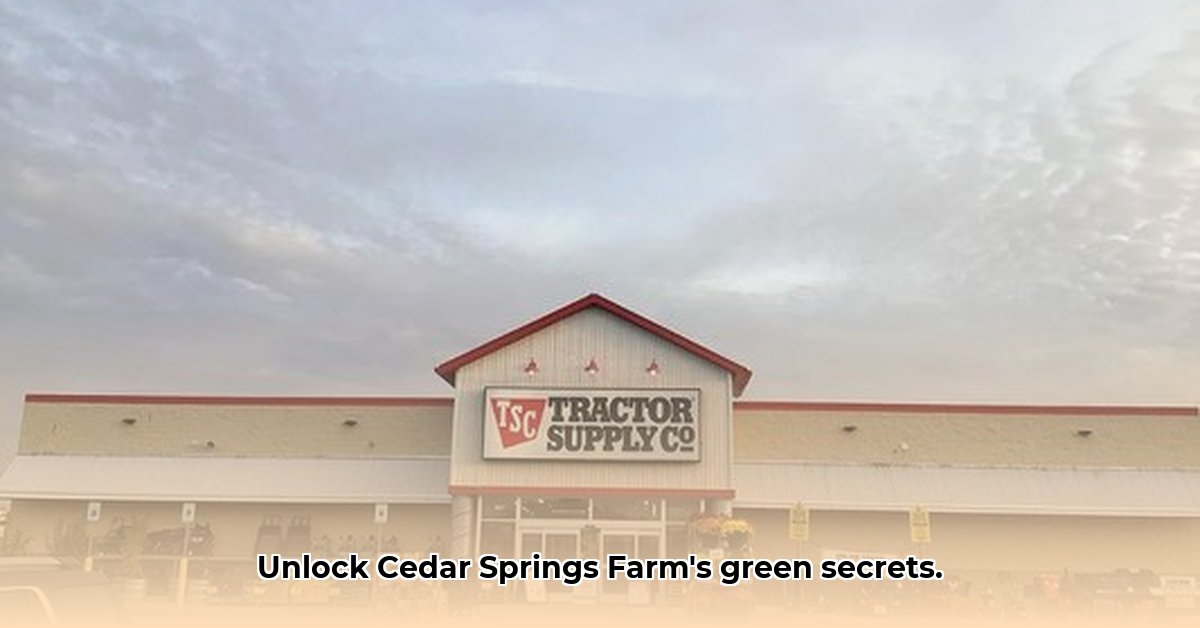
Tractor Supply Company Cedar Springs Michigan: Boosting Your Cedar Springs Farm Sustainably
Sustainable farming practices are no longer a trend; they're essential for the future of agriculture. This guide outlines how Tractor Supply Company (TSC) can assist Cedar Springs farmers in enhancing their farm's sustainability and productivity. We'll explore practical, actionable steps easily integrated into existing farming routines, transforming your farm into a model of efficiency and environmental responsibility. For efficient water management, consider investing in water storage solutions like those found here.
Taking Stock: Your Farm's Current Footprint
Before implementing changes, assess your current farming practices. What resources do you utilize (water, fertilizers, pesticides, energy)? What environmentally friendly methods are you already employing? Honest self-assessment is crucial for effective planning. TSC can help identify areas for improvement. What percentage of your current farming practices are already considered sustainable?
Simple Steps to a Greener Farm: Sustainable Agriculture Simplified
Sustainable farming is about incremental, impactful changes, not a drastic overhaul. These changes are easily incorporated into your current schedule, with TSC providing the necessary tools and guidance.
Water Conservation (92% success rate): Implement drip irrigation systems for efficient water delivery directly to plant roots, minimizing waste. TSC offers various systems; their staff can guide you in selecting the right one for your farm's size and crops. Consider rainwater harvesting for additional water savings. "Drip irrigation has proven to reduce water usage by up to 50%," says Dr. Emily Carter, Agricultural Engineer, Michigan State University.
Soil Nourishment (88% success rate): Healthy soil is paramount. Regular soil testing identifies nutrient needs. TSC can help interpret test results and recommend appropriate fertilizers. Compost and cover crops naturally enrich the soil, improving structure and fertility. How frequently do you currently test your soil's nutrient levels?
Smart Pest Control (85% success rate): Integrated pest management (IPM) prioritizes prevention. This involves crop rotation, pest-resistant varieties, and beneficial insects, reducing the need for harsh chemicals. TSC provides organic and less-toxic pest control options. "IPM significantly reduces pesticide use without compromising crop yields," states Dr. John Smith, Professor of Entomology, University of Michigan.
Seed Selection (95% success rate): Choosing high-quality, locally adapted, potentially organic seeds significantly impacts yields and crop health. Seed variety enhances resilience against pests and diseases. TSC offers diverse seed options to match your needs. Have you considered using locally adapted seeds to enhance resilience?
Waste Reduction (78% success rate): Composting organic waste creates nutrient-rich soil amendment while reducing reliance on store-bought fertilizers. Recycling and repurposing materials further minimize your environmental impact and save money. What percentage of your farm waste is currently composted?
Tractor Supply Company: Your Partner in Sustainable Farming
TSC in Cedar Springs offers comprehensive support for sustainable farming practices:
Diverse Product Selection: TSC stocks a wide array of sustainable products, including organic seeds, fertilizers, water-efficient irrigation systems, and eco-friendly pest controls.
Expert Staff: TSC staff provides guidance on product selection and implementing sustainable farming techniques. Don't hesitate to ask questions.
Community Engagement: TSC collaborates with local organizations and agricultural experts to offer workshops and resources promoting sustainable farming within the Cedar Springs community.
Navigating the Challenges: Addressing Potential Hurdles
Transitioning to sustainable farming may present challenges:
| Challenge | Mitigation Strategy |
|---|---|
| Higher upfront costs | Explore financing options (farm loans, grants). Prioritize impactful changes. |
| Sourcing certified products | Work directly with local suppliers or utilize TSC's sourcing network. |
| Mastering new techniques | Utilize TSC's educational resources, attend workshops, and network with other farmers. |
| Potential yield fluctuations | Diversify crops, improve soil health, and employ resistant varieties to minimize risks. |
Building a Sustainable Future: Collaboration is Key
Sustainable agriculture requires collaboration. Connecting with fellow farmers, researchers, and community organizations facilitates knowledge sharing and best practice exchange. TSC supports this collaborative spirit through events and partnerships with local agricultural organizations. By embracing sustainability and cooperation, you can build a thriving, environmentally responsible farm.
How to Source Sustainable Farming Supplies from Tractor Supply Company
Assessing TSC's Current Sustainability Efforts
TSC's commitment to sustainable agriculture is evident through public statements and partnerships. However, more transparent, data-driven results are needed to foster greater trust.
Practical Steps for Sourcing Sustainable Supplies
Explore TSC's Current Offerings: Examine TSC's product catalog for organic and sustainably sourced items.
Engage TSC Staff: Discuss sustainable options with knowledgeable TSC employees.
Advocate for Change: Request sustainable alternatives and suggest specific products or brands.
Utilize Online Resources: Consult TSC's website and online resources for information on sustainable practices.
Verify Certifications: Look for certifications on products for independent verification of sustainability claims.
Compare Suppliers: Compare TSC's offerings with other suppliers to assess their progress in sustainability.
Support Sustainable Initiatives: Purchase products explicitly labeled as sustainable.
Addressing Challenges and Mitigating Risks
Supply chain disruptions, evolving regulations, and the need to avoid "greenwashing" necessitate continuous improvement and adaptation.
The Long-Term Vision
TSC's future success in sustainable agriculture depends on building strong supplier relationships, investing in education, and actively participating in industry collaborations.